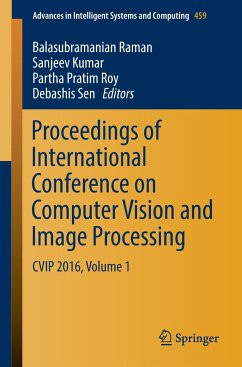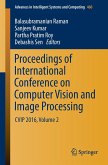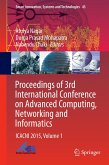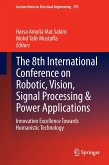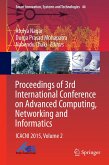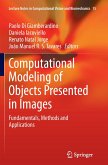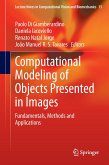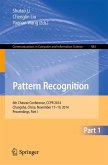Proceedings of International Conference on Computer Vision and Image Processing
CVIP 2016, Volume 1
Herausgegeben:Raman, Balasubramanian; Kumar, Sanjeev; Roy, Partha Pratim; Sen, Debashis
Proceedings of International Conference on Computer Vision and Image Processing
CVIP 2016, Volume 1
Herausgegeben:Raman, Balasubramanian; Kumar, Sanjeev; Roy, Partha Pratim; Sen, Debashis
- Broschiertes Buch
- Merkliste
- Auf die Merkliste
- Bewerten Bewerten
- Teilen
- Produkt teilen
- Produkterinnerung
- Produkterinnerung
This edited volume contains technical contributions in the field of computer vision and image processing presented at the First International Conference on Computer Vision and Image Processing (CVIP 2016). The contributions are thematically divided based on their relation to operations at the lower, middle and higher levels of vision systems, and their applications.
The technical contributions in the areas of sensors, acquisition, visualization and enhancement are classified as related to low-level operations. They discuss various modern topics - reconfigurable image system architecture,…mehr
Andere Kunden interessierten sich auch für
![Proceedings of International Conference on Computer Vision and Image Processing Proceedings of International Conference on Computer Vision and Image Processing]() Proceedings of International Conference on Computer Vision and Image Processing161,99 €
Proceedings of International Conference on Computer Vision and Image Processing161,99 €![Proceedings of 3rd International Conference on Advanced Computing, Networking and Informatics Proceedings of 3rd International Conference on Advanced Computing, Networking and Informatics]() Proceedings of 3rd International Conference on Advanced Computing, Networking and Informatics162,99 €
Proceedings of 3rd International Conference on Advanced Computing, Networking and Informatics162,99 €![The 8th International Conference on Robotic, Vision, Signal Processing & Power Applications The 8th International Conference on Robotic, Vision, Signal Processing & Power Applications]() The 8th International Conference on Robotic, Vision, Signal Processing & Power Applications161,99 €
The 8th International Conference on Robotic, Vision, Signal Processing & Power Applications161,99 €![Proceedings of 3rd International Conference on Advanced Computing, Networking and Informatics Proceedings of 3rd International Conference on Advanced Computing, Networking and Informatics]() Proceedings of 3rd International Conference on Advanced Computing, Networking and Informatics162,99 €
Proceedings of 3rd International Conference on Advanced Computing, Networking and Informatics162,99 €![Computational Modeling of Objects Presented in Images Computational Modeling of Objects Presented in Images]() Computational Modeling of Objects Presented in Images81,99 €
Computational Modeling of Objects Presented in Images81,99 €![Computational Modeling of Objects Presented in Images Computational Modeling of Objects Presented in Images]() Computational Modeling of Objects Presented in Images81,99 €
Computational Modeling of Objects Presented in Images81,99 €![Pattern Recognition Pattern Recognition]() Pattern Recognition41,99 €
Pattern Recognition41,99 €-
-
-
This edited volume contains technical contributions in the field of computer vision and image processing presented at the First International Conference on Computer Vision and Image Processing (CVIP 2016). The contributions are thematically divided based on their relation to operations at the lower, middle and higher levels of vision systems, and their applications.
The technical contributions in the areas of sensors, acquisition, visualization and enhancement are classified as related to low-level operations. They discuss various modern topics - reconfigurable image system architecture, Scheimpflug camera calibration, real-time autofocusing, climate visualization, tone mapping, super-resolution and image resizing.
The technical contributions in the areas of segmentation and retrieval are classified as related to mid-level operations. They discuss some state-of-the-art techniques - non-rigid image registration, iterative image partitioning, egocentric object detection and video shot boundary detection.
The technical contributions in the areas of classification and retrieval are categorized as related to high-level operations. They discuss some state-of-the-art approaches - extreme learning machines, and target, gesture and action recognition. A non-regularized state preserving extreme learning machine is presented for natural scene classification. An algorithm for human action recognition through dynamic frame warping based on depth cues is given. Target recognition in night vision through convolutional neural network is also presented. Use of convolutional neural network in detecting static hand gesture is also discussed.
Finally, the technical contributions in the areas of surveillance, coding and data security, and biometrics and document processing are considered as applications of computer vision and image processing. They discuss some contemporary applications. A few of them are a system for tackling blind curves, a quick reaction target acquisition and tracking system, an algorithm to detect for copy-move forgery based on circle block, a novel visual secret sharing scheme using affine cipher and image interleaving, a finger knuckle print recognition system based on wavelet and Gabor filtering, and a palmprint recognition based on minutiae quadruplets.
The technical contributions in the areas of sensors, acquisition, visualization and enhancement are classified as related to low-level operations. They discuss various modern topics - reconfigurable image system architecture, Scheimpflug camera calibration, real-time autofocusing, climate visualization, tone mapping, super-resolution and image resizing.
The technical contributions in the areas of segmentation and retrieval are classified as related to mid-level operations. They discuss some state-of-the-art techniques - non-rigid image registration, iterative image partitioning, egocentric object detection and video shot boundary detection.
The technical contributions in the areas of classification and retrieval are categorized as related to high-level operations. They discuss some state-of-the-art approaches - extreme learning machines, and target, gesture and action recognition. A non-regularized state preserving extreme learning machine is presented for natural scene classification. An algorithm for human action recognition through dynamic frame warping based on depth cues is given. Target recognition in night vision through convolutional neural network is also presented. Use of convolutional neural network in detecting static hand gesture is also discussed.
Finally, the technical contributions in the areas of surveillance, coding and data security, and biometrics and document processing are considered as applications of computer vision and image processing. They discuss some contemporary applications. A few of them are a system for tackling blind curves, a quick reaction target acquisition and tracking system, an algorithm to detect for copy-move forgery based on circle block, a novel visual secret sharing scheme using affine cipher and image interleaving, a finger knuckle print recognition system based on wavelet and Gabor filtering, and a palmprint recognition based on minutiae quadruplets.
Produktdetails
- Produktdetails
- Advances in Intelligent Systems and Computing 459
- Verlag: Springer / Springer Nature Singapore / Springer, Berlin
- Artikelnr. des Verlages: 978-981-10-2103-9
- 1st ed. 2017
- Seitenzahl: 660
- Erscheinungstermin: 23. Dezember 2016
- Englisch
- Abmessung: 235mm x 155mm x 36mm
- Gewicht: 989g
- ISBN-13: 9789811021039
- ISBN-10: 9811021031
- Artikelnr.: 45237648
- Herstellerkennzeichnung Die Herstellerinformationen sind derzeit nicht verfügbar.
- Advances in Intelligent Systems and Computing 459
- Verlag: Springer / Springer Nature Singapore / Springer, Berlin
- Artikelnr. des Verlages: 978-981-10-2103-9
- 1st ed. 2017
- Seitenzahl: 660
- Erscheinungstermin: 23. Dezember 2016
- Englisch
- Abmessung: 235mm x 155mm x 36mm
- Gewicht: 989g
- ISBN-13: 9789811021039
- ISBN-10: 9811021031
- Artikelnr.: 45237648
- Herstellerkennzeichnung Die Herstellerinformationen sind derzeit nicht verfügbar.
Balasubramanian Raman is an Associate Professor in the Department of Computer Science and Engineering at Indian Institute of Technology Roorkee from 2013. He has obtained MSc degree in Mathematics from Madras Christian College (University of Madras) in 1996 and PhD from Indian Institute of Technology Madras in 2001. He was a post doctoral fellow at University of Missouri Columbia, USA in 2001-2002 and a post doctoral associate at Rutgers, the State University of New Jersey, USA in 2002-2003. He joined Department of Mathematics at Indian Institute of Technology Roorkee as Lecturer in 2004 and became Assistant Professor in 2006 and Associate Professor in 2012. He was a Visiting Professor and a member of Computer Vision and Sensing Systems Laboratory in the Department of Electrical and Computer Engineering at University of Windsor, Canada during May August 2009. So far he has published more than 190 papers in reputed Journals and Conferences. His area of research includes visiongeometry, digital watermarking using mathematical transformations, image fusion, biometrics and secure image transmission over wireless channel, content based image retrieval and hyperspectral imaging. Sanjeev Kumar is working as an Assistant Professor with Department of Mathematics, Indian Institute of Technology Roorkee from November 2010. Earlier, he worked as a postdoctoral fellow with Department of Mathematics and Computer Science, University of Udine, Italy from March 2008 to November 2010. He has completed his PhD in Mathematics from IIT Roorkee, India in 2008. His areas of research include image processing, inverse problems and machine learning. He has co-convened the first international conference on computer vision and image processing in 2016, and has served as a reviewer and program committee member of more than 20 international journals and conferences. He conducted two workshops on Image Processing at IIT Roorkee in recent years. He has published more than 55 papers in various international journals and reputed conferences. He has completed a couple of sponsored research projects. Partha Pratim Roy received his PhD degree in Computer Science in 2010 from Universitat Autònoma de Barcelona, Spain. He worked as postdoctoral research fellow in the Computer Science Laboratory (LI, RFAI group), France and in Synchromedia Lab, Canada. He also worked as Visiting Scientist at Indian Statistical Institute, Kolkata, India in 2012 and 2014. Presently, Dr. Roy is working as Assistant Professor at Department of Computer Science and Engineering, Indian Institute of Technology (IIT), Roorkee. His main research area is Pattern Recognition. He has published more than 60 research papers in various international journals, conference proceedings. Dr. Roy has participated in several national and international projects funded by the Spanish and French government. In 2009, he won the best student paper award in International Conferenceon Document Analysis and Recognition (ICDAR). He has gathered industrial experience while working as an Assistant System Engineer in TATA Consultancy Services (India) from 2003 to 2005 and as Chief Engineer in Samsung, Noida from 2013 to 2014. Debashis Sen is an Assistant Professor at the Department of Electronics and Electrical Communication Engineering in Indian Institute of Technology (IIT) Kharagpur. Earlier, from September 2014 to May 2015, he was an Assistant Professor at the Department of Computer Science and Engineering in Indian Institute of Technology (IIT) Roorkee. Before joining Indian Institute of Technology, he had worked as a post-doctoral research fellow at School of Computing, National University of Singapore for about 3 years. He received his PhD degree from the faculty of engineering, Jadavpur University, Kolkata, India in 2011 and his M.A.Sc. degree from the Department of Electrical and Computer Engineering, Concordia University, Montreal, Canada in 2005. He has worked at the Center for Soft Computing Research of Indian Statistical Institute from 2005 to 2011 as a research scholar, and at the center for signal processing and communications and video processing and communications group of Concordia University as a research assistant from 2003 to 2005. He is currently an associate editor of IET Image Processing journal. He has co-convened the first international conference on computer vision and image processing in 2016, and has served as a reviewer and program committee member of more than 30 international journals and conferences. Over the last decade, he has published in high impact international journals, which are well cited, and has received two best paper awards. He heads the vision, image and perception group in IIT Kharagpur. He is a member of Institute of Electrical and Electronics Engineers (IEEE), IEEE Signal Processing Society and Vision Science Society (VSS). His research interests are in vision, image and video processing, uncertainty handling, bio-inspired computation, eye movement analysis, computational visual perception and multimedia signal processing.
Chapter 1. Background Modeling Using Temporal-local Sample Density Outlier Detection.- Chapter 2. Analysis of Framelets for the Microcalcification.- Chapter 3. Reconfigurable Architecture Based Implementation of Non-Uniformity Correction for Long Wave IR Sensors.- Chapter 4. Finger Knuckle Print Recognition Based on Wavelet and Gabor Filtering.- Chapter 5. Design of Advanced Correlation Filters for Finger Knuckle Print Authentication Systems.-Chapter 6. A Non-Linear Modified CONVEF-AD Based Approach for Low-Dose Sinogram Restoration.- Chapter 7. System Design for Tackling Blind Curves.- Chapter 8. A Novel Visual Word Assignment Model for Content Based Image Retrieval.- Chapter 9. Online Support Vector Machine Based on Minimum Euclidean Distance.- Chapter 10. Design and Development of 3D Urban Geographical Information Retrieval Application Employing only Open Source Instruments.- Chapter 11. A Textural Characterization of Coal SEM Images Using Functional Link Artificial Neural Network.- Chapter 12. Template-based Automatic High-speed Relighting of Faces.- Chapter 13. An Improved Contextual Information Based Approach for Anomaly Detection via Adaptive Inference for Surveillance Application.- Chapter 14. A Novel Approach of an (n; n) Multi Secret Image Sharing Scheme Using Additive Modulo.- Chapter 15. Scheimpflug Camera Calibration Using Lens Distortion Model.- Chapter 16. Microscopic Image Classification Using DCT for the Detection of Acute Lymphoblastic Leukemia (ALL).- Chapter 17. Robust Hash Generation Technique for Image Authentication Using DWT.- Chapter 18. Robust Parametric Twin Support Vector Machine and Its Application in Human Activity Recognition.- Chapter 19. Separating Indic Scripts with 'Matra' - A Precursor to Script Identification in Multi-script Documents.- Chapter 20. Efficient Multimodal Biometric Feature Fusion Using Block-sum and Minutiae Techniques.- Chapter 21. Video Synopsis for IR Imagery Considering Video as a 3D Data Cuboid.- Chapter 22. Performance Analysis of Texture Image Retrieval in Curvelet, Contourlet and Local Ternary Pattern Using DNN and ELM Classifiers for MRI Brain Tumor Images.- Chapter 23. ROI Segmentation from Brain MR Images with a Fast Multi-Level Thresholding.- Chapter 24. Surveillance Scene Segmentation Based on Trajectory Classification Using Supervised.- Chapter 25. Classification of Object Trajectories Represented by High-level Features using Unsupervised Learning.- Chapter 26. A Hybrid Method for Image Categorization Using Shape Descriptors and Histogram of Oriented Gradients.- Chapter 27. Local Binary Pattern and Its Variants for Target Recognition in Infrared Imagery.- Chapter 28. Applicability of Self Organizing Maps in Content Based Image Classification.- Chapter 29. Road Surface Classification Using Texture Synthesis Based on Grey-Level Co-occurrence Matrix.- Chapter 30. Electroencephalography Based Emotion Recognition Using Gray Level Co-occurrence Matrix Features.- Chapter 31. Quick Reaction Target Acquisition and Tracking System.- Chapter 32. Low-complexity Non-rigid Image Registration Using Feature-based Diffeomorphic Log-Demons.- Chapter 33. Spotting of Keyword Directly in Run-length Compressed Documents.- Chapter 34. Design and Implementation of a Real Time Auto Focus Algorithm for Thermal Imagers.- Chapter 35. Parameter Free Clustering Approach for Event Summarization in Videos.- Chapter 36. Connected Operators for Non-text Object Segmentation in Grayscale Document Images.- Chapter 37. Non-Regularized State Preserving Extreme Learning Machine for Natural Scene Classification.- Chapter 38. A Local Correlation and Directive Contrast Based Image Fusion.- Chapter 39. Multi-exposure Image Fusion UsingPropagated Image Filtering.- Chapter 40. Tone Mapping HDR Images Using Local Texture and Brightness Measures.- Chapter 41. Pre and Post Fingerprint Skeleton Enhancement for Minutiae Extraction.- Chapter 42. Content Aware Image Size Reduction Using Low Energy Maps for Reduced Distortion.- Chapter 43. Artificial Immune Hybrid Photo Album Classifier.- Chapter 44. Crowd Disaster Avoidance System (CDAS) by Deep Learning Using eXtended Center Symmetric Local Binary Pattern (XCS-LBP) Texture Features.- Chapter 45. A Novel Visualization and Tracking Framework for Analyzing the Inter/Intra Cloud Pattern Formation to Study their Impact on Climate.- Chapter 46. Cancelable Biometric Template Security Using Segment-Based Visual Cryptography.- Chapter 47. PCB Defect Classification Using Logical Combination of Segmented Copper and Non-Copper Part.- Chapter 48. Gait Recognition Based Human Identification and Gender Classification.- Chapter 49. A Novel Approach to Corner Detection Using Random Forests.- Chapter 50. Symbolic Representation and Classification of Logos.- Chapter 51. A Hybrid Method Based CT Image Denoising using Non-subsampled Contourlet and Curvelet Transforms.- Chapter 52. Using Musical Beats to Segment Videos of Bharatanatyam Adavu's.- Chapter 53. Parallel Implementation of RSA 2D-DCT Steganography and Chaotic 2D-DCT Steganography.- Chapter 54. Thermal Face Recognition Using Face Localized Scale Invariant Feature Transform.- Chapter 55. Integrating Geometric and Textural Features for Facial Emotion Classification Using SVM Frameworks.- Chapter 56. Fast Non-blind Image De-blurring with Sparse Priors.
Chapter 1. Background Modeling Using Temporal-local Sample Density Outlier Detection.- Chapter 2. Analysis of Framelets for the Microcalcification.- Chapter 3. Reconfigurable Architecture Based Implementation of Non-Uniformity Correction for Long Wave IR Sensors.- Chapter 4. Finger Knuckle Print Recognition Based on Wavelet and Gabor Filtering.- Chapter 5. Design of Advanced Correlation Filters for Finger Knuckle Print Authentication Systems.-Chapter 6. A Non-Linear Modified CONVEF-AD Based Approach for Low-Dose Sinogram Restoration.- Chapter 7. System Design for Tackling Blind Curves.- Chapter 8. A Novel Visual Word Assignment Model for Content Based Image Retrieval.- Chapter 9. Online Support Vector Machine Based on Minimum Euclidean Distance.- Chapter 10. Design and Development of 3D Urban Geographical Information Retrieval Application Employing only Open Source Instruments.- Chapter 11. A Textural Characterization of Coal SEM Images Using Functional Link Artificial Neural Network.- Chapter 12. Template-based Automatic High-speed Relighting of Faces.- Chapter 13. An Improved Contextual Information Based Approach for Anomaly Detection via Adaptive Inference for Surveillance Application.- Chapter 14. A Novel Approach of an (n; n) Multi Secret Image Sharing Scheme Using Additive Modulo.- Chapter 15. Scheimpflug Camera Calibration Using Lens Distortion Model.- Chapter 16. Microscopic Image Classification Using DCT for the Detection of Acute Lymphoblastic Leukemia (ALL).- Chapter 17. Robust Hash Generation Technique for Image Authentication Using DWT.- Chapter 18. Robust Parametric Twin Support Vector Machine and Its Application in Human Activity Recognition.- Chapter 19. Separating Indic Scripts with 'Matra' - A Precursor to Script Identification in Multi-script Documents.- Chapter 20. Efficient Multimodal Biometric Feature Fusion Using Block-sum and Minutiae Techniques.- Chapter 21. Video Synopsis for IR Imagery Considering Video as a 3D Data Cuboid.- Chapter 22. Performance Analysis of Texture Image Retrieval in Curvelet, Contourlet and Local Ternary Pattern Using DNN and ELM Classifiers for MRI Brain Tumor Images.- Chapter 23. ROI Segmentation from Brain MR Images with a Fast Multi-Level Thresholding.- Chapter 24. Surveillance Scene Segmentation Based on Trajectory Classification Using Supervised.- Chapter 25. Classification of Object Trajectories Represented by High-level Features using Unsupervised Learning.- Chapter 26. A Hybrid Method for Image Categorization Using Shape Descriptors and Histogram of Oriented Gradients.- Chapter 27. Local Binary Pattern and Its Variants for Target Recognition in Infrared Imagery.- Chapter 28. Applicability of Self Organizing Maps in Content Based Image Classification.- Chapter 29. Road Surface Classification Using Texture Synthesis Based on Grey-Level Co-occurrence Matrix.- Chapter 30. Electroencephalography Based Emotion Recognition Using Gray Level Co-occurrence Matrix Features.- Chapter 31. Quick Reaction Target Acquisition and Tracking System.- Chapter 32. Low-complexity Non-rigid Image Registration Using Feature-based Diffeomorphic Log-Demons.- Chapter 33. Spotting of Keyword Directly in Run-length Compressed Documents.- Chapter 34. Design and Implementation of a Real Time Auto Focus Algorithm for Thermal Imagers.- Chapter 35. Parameter Free Clustering Approach for Event Summarization in Videos.- Chapter 36. Connected Operators for Non-text Object Segmentation in Grayscale Document Images.- Chapter 37. Non-Regularized State Preserving Extreme Learning Machine for Natural Scene Classification.- Chapter 38. A Local Correlation and Directive Contrast Based Image Fusion.- Chapter 39. Multi-exposure Image Fusion UsingPropagated Image Filtering.- Chapter 40. Tone Mapping HDR Images Using Local Texture and Brightness Measures.- Chapter 41. Pre and Post Fingerprint Skeleton Enhancement for Minutiae Extraction.- Chapter 42. Content Aware Image Size Reduction Using Low Energy Maps for Reduced Distortion.- Chapter 43. Artificial Immune Hybrid Photo Album Classifier.- Chapter 44. Crowd Disaster Avoidance System (CDAS) by Deep Learning Using eXtended Center Symmetric Local Binary Pattern (XCS-LBP) Texture Features.- Chapter 45. A Novel Visualization and Tracking Framework for Analyzing the Inter/Intra Cloud Pattern Formation to Study their Impact on Climate.- Chapter 46. Cancelable Biometric Template Security Using Segment-Based Visual Cryptography.- Chapter 47. PCB Defect Classification Using Logical Combination of Segmented Copper and Non-Copper Part.- Chapter 48. Gait Recognition Based Human Identification and Gender Classification.- Chapter 49. A Novel Approach to Corner Detection Using Random Forests.- Chapter 50. Symbolic Representation and Classification of Logos.- Chapter 51. A Hybrid Method Based CT Image Denoising using Non-subsampled Contourlet and Curvelet Transforms.- Chapter 52. Using Musical Beats to Segment Videos of Bharatanatyam Adavu's.- Chapter 53. Parallel Implementation of RSA 2D-DCT Steganography and Chaotic 2D-DCT Steganography.- Chapter 54. Thermal Face Recognition Using Face Localized Scale Invariant Feature Transform.- Chapter 55. Integrating Geometric and Textural Features for Facial Emotion Classification Using SVM Frameworks.- Chapter 56. Fast Non-blind Image De-blurring with Sparse Priors.

